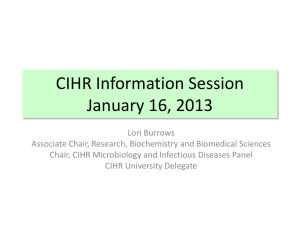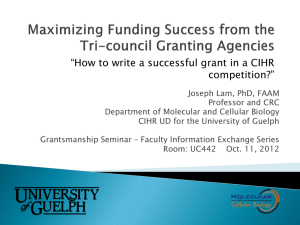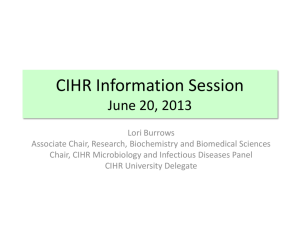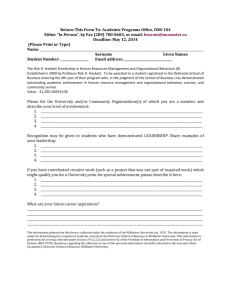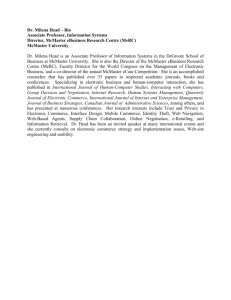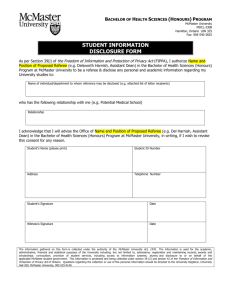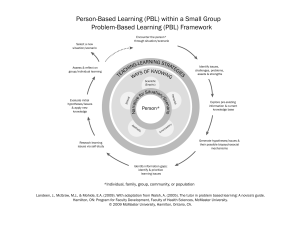June 9, 2015 - Faculty of Health Sciences
advertisement
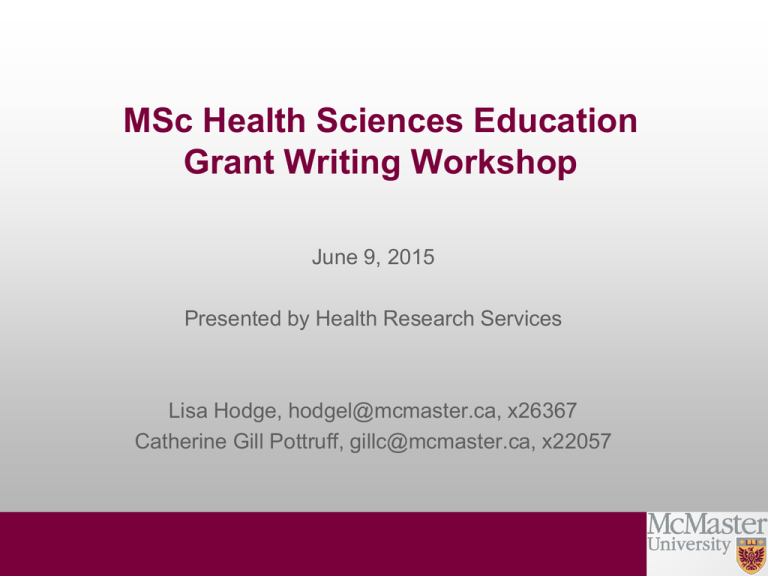
MSc Health Sciences Education Grant Writing Workshop June 9, 2015 Presented by Health Research Services Lisa Hodge, hodgel@mcmaster.ca, x26367 Catherine Gill Pottruff, gillc@mcmaster.ca, x22057 McMaster Research Services Resources Introduction to Research Services at McMaster Health Research Services (HRS) – Faculty of Health Sciences: – Wendy Hollinshead, Assistant Director, Grants Catherine Gill Pottruff, Senior Grants Advisor Michelle Dowling, Senior Grants Advisor Lisa Hodge, Senior Grants Advisor – CIHR Research Office for Administration, Development & Support (ROADS): – Sherisse Webb, Assistant Director – Development Pam McIntyre, Senior Advisor – SSHRC contact Colleen McGrath, Senior Grants Advisor – NSERC contact Cynthia Belaskie, Senior Grants Advisor – CIHR contact McMaster Industry Liaison Office (MILO): – Gay Yuyitung, Business Development Manager – Industry-sponsored research contracts & commercialization Grant Writing & Grant Proposal Submissions Presented by Lisa Hodge, HRS “Grantsmanship” is not just about the writing Good grant writing takes time, planning, and direction Advice seeking is smart grant planning Most researchers are great at science and not so great at sales – Great grant writers sell research ideas so that great scientists can discover great things! THREE STEP PROCESS OF GRANT SUBMISSIONS 1. PLANNING: – Funding Sources – the right fit/the right choices – Strategies for grant submission planning – Managing timelines – Finding/sourcing help – seeking expertise 2. WRITING: – Follow instructions – “Arts and crafts” of putting it together 3. SUBMITTING: – Eligibility – Sponsor process – Institutional process 1. PLANNING: Ideas/Inspiration/Collaboration: Know/Define Program of Research (research area/interest) Colleagues (Network of Support and Collaborators) Sources of Funding – the Right Fit Independent research – making your own way Implementation: Develop Strategy for Funding submission(s) Manage Timelines Seek Advice and Administrative Help “Doing research is fun; writing about the research is not. Despite this, we must write journal articles because science communicates through its journals.” Paul Silvia 2. WRITING: THE BASICS: Follow instructions Less is more – short and small (4 rules) Big words can cause big problems White space counts The “write” order Researchers are not automatically good writers, and research cannot be accomplished without good grant writing. FOLLOW THE INSTRUCTIONS: Print a copy of CURRENT competition instructions Basic: Participant requirements Eligible research areas Format Strategic: Review criteria guides your titles and content Looking for space: LESS IS MORE! 4 LITTLE RULES 1. OMIT NEEDLESS WORDS 2. USE GOOD, SMALL WORDS 3. CORRECT USE OF ABBREVIATIONS 4. ONE WORD CAN BE ENOUGH 1. OMIT NEEDLESS WORDS: Delete very, quite, basically, actually, virtually, extremely, remarkably, completely, at all, and so forth. Basically, these quite useless words add virtually nothing at all; like weeds, they'll in fact actually smother your sentences completely. 1a. OMIT NEEDLESS WORDS: Delete very, quite, basically, actually, virtually, extremely, remarkably, completely, at all, and so forth. Basically, these quite useless words add virtually nothing at all; like weeds, they'll in fact actually smother your sentences completely. 1b. OMIT NEEDLESS WORDS: Delete very, quite, basically, actually, virtually, extremely, remarkably, completely, at all, and so forth. These words add nothing; like weeds, they'll smother your sentences. 2. USE GOOD, SMALL WORDS: Of 110 Stanford undergraduates polled, most admitted to making their writing more complex to appear smarter. ‘Have you ever changed the words in an academic essay to make the essay sound more valid or intelligent by using complicated language?’ 86.4% said yes. Nearly two-thirds answered yes to: ‘When you write an essay, do you turn to the thesaurus to choose words that are more complex to give the impression that the content is more valid or intelligent?’ Oppenheimer Appl. Cognit. Psychol. 20: 139–156 (2006) 2a. USE GOOD, SMALL WORDS: Original phrase: The medical community indicates that a program of downsizing average total daily caloric intake is maximally efficacious in the field of proactive weightreduction methodologies. Revised phrase: Doctors say that the best way to lose weight is to eat less. 3. ABBREVIATIONS Less is more (use fewer abbreviations) Jargon is confusing; abbreviated jargon is maddening Get it right – use correct abbreviations 3a. USE FEWER ABBREVIATIONS COMPLICATED FORMULAS AND MULTIPLE ABBREVIATIONS CAN LOSE THE READER SCIENTIFIC JARGON CAN MAKE ABBREVIATIONS IMPOSSIBLE TO FOLLOW When the flow of the submission is impaired by the use of jargon or overuse of abbreviations, then the savings in space is lost in translation. 3b. USE CORRECT ABBREVIATIONS Time: s, min, h Centrifugal force: x g (not RPM) Units: kDa, μM, μm 4. ONE WORD CAN BE ENOUGH Formulaic Phrases (use 1 word or skip) for the purpose of (to) due to the fact that (because) at this point in time (now) in the near future (soon) with regard to (about) in view of the fact that (because) BIG WORDS ARE BIG PROBLEMS Don’t try to use big words in place of small simple words---less is more “Many individuals display inaccurate selfassessments of their deficient writing skill levels….” ("Few people realize how badly they write”) Paul Silvia Don’t be one of them WHITE SPACE COUNTS Page limitations can leave a grant writer feeling the need to compress font and reduce headers to maximize writing space Condensed font is obvious to reviewers White space makes reading easier and more enjoyable for reviewers Overuse of underlining or bolding is as bad as no white space THE “WRITE” ORDER Develop outline (lots of messages to self) Develop provisional title Results References – literature review Materials, Subjects, and Methods Introduction Discussion Summary Abstract Title, keywords and footnotes 3. SUBMITTING: What you must know WELL before submitting: Eligibility rules and restrictions (sponsor specific). Institutional Process (facilitates review and approval) Sponsor Process Contact a Senior Grant Advisor in your faculty research office for more information. ELIGIBILITY Before you start an application, always check the eligibility for restrictions or exceptions that determine who can apply for funding Sponsors have different definitions for different types of applicants and participants Guidelines can be more or less restrictive and can be related to other sources of funding already held There are sponsor specific limits to how many applications can be under review at once INSTITUTIONAL “PROCESS” All proposals for research funding from “applicants” must obtain institutional approval on behalf of McMaster University prior to submission. A copy of the proposal (including budget), a completed “Checklist” approval form, and ethics certifications (if applicable) must be submitted to the appropriate research office to obtain institutional approval/sign off. Contact a Senior Grants Advisor in your faculty research office for more information about review deadlines and approval processes. SPONSOR “PROCESS” & SPECIFICS Every sponsor is different: Guidelines for submitting Platform for online submission (and review) Timelines and deadlines (LOI and other ‘lingo’) Where to look to Find Funding? Subscribe to funding bulletins – HRS: hsresadm@mcmaster.ca – ROADS: contact Research Information Specialist, Susan Gordon (gordosc@mcmaster.ca) Search the COS Pivot database: http://pivot.cos.com/ Search the major funding agencies websites Contact an expert for ROADS, contact Research Information Specialist, Susan Gordon, gordosc@mcmaster.ca) For HRS, contact Augusta Beck, becka@mcmaster.ca Tri-Agency: CIHR, NSERC and SSHRC Choosing the correct funding vehicle is the starting point for writing a grant submission Write to the sponsor criteria and mandate Canadian Institutes of Health Research (CIHR): major federal funding agency for health research to excel, according to internationally accepted standards of scientific excellence, in the creation of new knowledge and its translation into improved health for Canadians, more effective health services and products and a strengthened Canadian health care system. Natural Sciences and Engineering Research Council of Canada (NSERC): supports both basic university research through discovery grants and project research through partnerships among post-secondary institutions, governments and the private sector, as well as the advanced training of highly qualified people. Social Sciences and Humanities Research Council of Canada (SSHRC): supports university-based research, research training and knowledge mobilization activities in the social sciences and humanities. CIHR Open Operating Grants CIHR 2015-16 Currently under reform, OOG replaced by Project Scheme Project Scheme (similar to old OOG Competition) Project competitions occur twice a year in March and September Next competition: Registration due Jan 18, 2016 – Pilot 1 Application due March 1, 2016 Next Information Session: late November 2015 – info to be posted in funding opportunities bulletin and HRS website. https://www.researchnetrecherchenet.ca/rnr16/vwOpprtntyDtls.do?prog=2237&view=currentOpps&org=CIHR&type=EXAC T&resultCount=25&sort=program&all=1&masterList=true Tips: Provide a draft for review to the research office by (or before) the INTERNAL deadline (usually 2 wks before FINAL) Success rates appear to be related to “peer review” Spell check is not always correct – layman’s review for grammar and spelling Common CV can be a “time-sucker”- keep it up to date Resubmissions should not take less effort or time than a new submission; review and revise early Offer peer reviewer comments to research office to assist with resubmission revisions REVIEW - again and again Read the instructions (before, during, after) Start online application before INTERNAL deadlines Don’t underestimate time required to complete Manage timelines of sponsor and research office Review previous successful applications (contact your Advisor for help in obtaining these) Peer review - ask a non-related colleague to review for content/accuracy/grammar Use plain/lay language when instructed Translation and training HQP should be included Emphasize outcomes and value to Canadians Budget Suggestions Make sure your Budget is realistic Consider using at table for lots of data Link budget items to aims/objectives in the proposal (salaries are approximate; use Departmental rates) Student Year 1 Year 2 PhD #1 22,000 22,000 Master’s #1 18,000 PhD #2 Master’s #2 18,000 Year 3 Year 4 Year 5 22,000 22,000 22,000 18,000 18,000 40,000 40,000 18,000 Master’s #3 Total 40,000 40,000 40,000 Grant Proposal Submissions Presented by Catherine Gill Pottruff Senior Grants Advisor, Health Research Services Now that I’ve written it, what do I do with it? Why do applications not get funded? Now That I’ve Written It, What Do I Do With It? McMaster has several Research Offices to assist you: – Health Research Services (HRS) – Research Office for Administration, Development and Support (ROADS) – McMaster Industry Liaison Office (MILO) We all have similar responsibilities, but specific areas to support Health Research Services Supports Faculty of Health Sciences only Pre-award Services: Identification of funding opportunities Provision of information sessions Assistance with budget development Review of grant submissions Review for compliance with agency and institutional guidelines Obtaining of institutional signatures Health Research Services Post-Award Services: Budget revisions and amendments Ensures that researchers and the University are protected through funding agreements and compliance with agency and institutional policy Processes account requests General Contact Information: HSC 3H9 hsresadm@mcmaster.ca x 22465 Who Do I Talk To? Michelle Dowling Catherine Gill Pottruff Lisa Hodge Biochem Family Med OBGYN Oncology Rehab Nursing CE&B (A-K) Medicine (A-K) dowlinml@ mcmaster.ca x 28141 Anesthesia Pathology Paediatrics Psychiatry Radiology Surgery CE&B (L-Z) Medicine (L-Z) gillc@ mcmaster.ca x 22057 CIHR (all departments) hodgel@ mcmaster.ca x 26367 The Others ROADS: supports everyone else other than FHS MILO: is involved in intellectual property and industry/commercialization support I Need Help, FAST! Our HRS internal deadlines are generally two weeks prior to the agency deadline The more information we have, and the earlier we get it, the better we can help you Submitting an Application to HRS for Review and Institutional Signatures Your application should be fairly close to final Provide all the documents: HRS Checklist, signed by PI/Supervisor and Chair Application Form Proposal Budget Budget Justification If the application requires signatures, make sure you get Department sign-off first HRS Checklist A Couple of Hints About Budgets Read the agency guidelines carefully to see what they consider eligible Some agencies allow overhead; if they do, put in the maximum allowed Staffing: Don’t forget fringe benefits on top of staff salaries Trainee Stipends: Generally fringe benefits are not allowed on Master’s/PhD candidate or CIHR PDF stipends What Does HRS Do With My Application? Review thoroughly for content and style, as well as from the institutional point of view, and provide back comments, suggestions and reminders about agency guidelines Obtain an institutional signature for you, usually Dr Stephen Collins, FHS Associate Dean of Research Enter your proposal into MOSAIC My Application Has Been Funded! Now What Happens? Some scholarships/fellowships are handled through Grad Studies, some through HRS Operating funds for FHS researchers almost always come through HRS Trainees cannot hold funding in their own names, it must be held by the supervisor The exception is Tri-Council funding (CIHR/ NSERC/SSHRC) with a research allowance What Do I Need To Give HRS For An Account? HRS checklist Award Letter Signed Acceptance, if required by agency Final Application/Proposal/Budget Revised Budget, if the award amount is different from what you asked for Ethics Approvals A Quick Note About Ethics There are several ethics/approval boards here: – HIREB, AREB, MREB, Biohazard, Health Physics When preparing your application, make sure you’ve got the right board and the most recent forms (check their websites) Do you need a new full application or is your project an amendment of your supervisor’s? Biohazard – make sure you have the funded project added to your supervisor’s BUP What Does HRS Do With My Award? Review it for completeness, ensuring we have all the information we need Process the account opening request Hand it over to Health Sciences Finance to activate the account HSF works with the PI and Department Finance staff to manage the account for the life of the grant PI is responsible for any required reporting Why Do Applications Not Get Funded? A grant application is a sales document; you need to persuade the reviewers that your idea is worthwhile and deserves funding Common Errors Technical Overoptimism Budget Evaluation Plan “So What?” Technical Errors ISSUES Your proposal doesn’t match the agency’s interest You didn’t follow directions It’s poorly written, crammed together with typos and jargon AVOID BY Research the opportunity before you start Double check the eligibility and format guidelines Find a proof reader Overoptimistic Proposal ISSUES Too many objectives to meet in the time or funding available Assumption that all experiments will yield expected results Overestimation of potential participants New and untried procedures AVOID BY Limit objectives to 2-4 max Have a backup plan Show you have an adequate patient population base Pilot studies for feasibility and training Budget Woes ISSUES Ask is for too much or too little Obvious budget padding Inadequate staffing or use of personnel US/European vs Canadian funds AVOID BY Be realistic Get quotes for services or purchases Protocol-driven expenses vs standard of care Standard institutional salaries/fringe benefits Appropriate use of personnel Exchange rate Inadequate Evaluation / Training Plans ISSUES Data analysis section is short, vague or unfinished Planned tests are inadequate or inappropriate Knowledge translation is not mentioned Inclusion of trainees is crucial for CIHR AVOID BY Consult with a statistician in the planning phase Think outside the box for knowledge translation Send HQP trainees to conferences “So What?” The art of grantsmanship is in convincing your reviewers why this particular project is deserving of funding, over all the other ones in the competition The Big Picture Your reviewers may be in your field but likely are not experts in your specialty Tell them why you want to investigate your aims, why it’s important and what impact it will have Make sure the science is sound, feasible and complete Make sure you prove you can get the results in the time and funding allotted It’s Not The End of The World If You Aren’t Funded (This Time) In the last CIHR Operating Grant Competition, the Canada-wide success rate was about 14% Use the reviewers’ comments to improve your next submission You will learn something new with every application “You have to have a thick skin, and remember that it’s very uncommon to be successful on a first try for funding; you have to be able to bounce back, take the criticism, implement it and keep trying – a combination of hard work, dedication and stubbornness!” Dr Rich Whitlock Cardiac Surgeon

